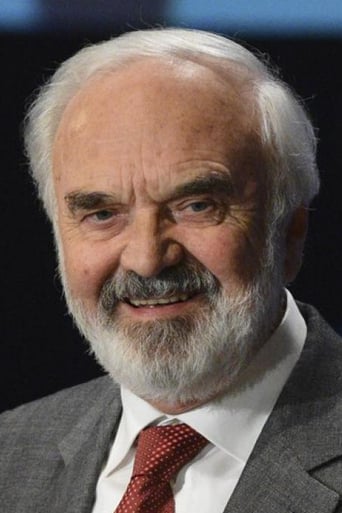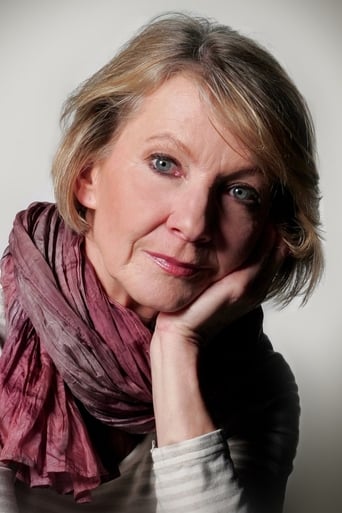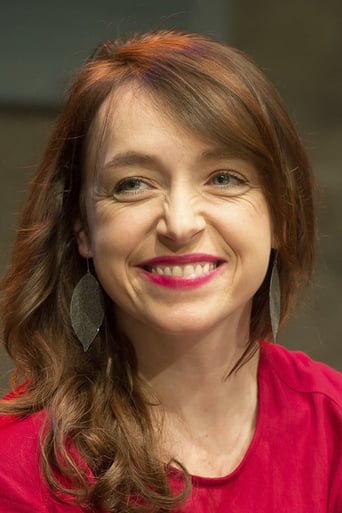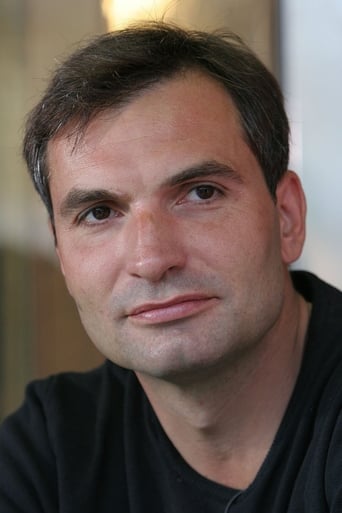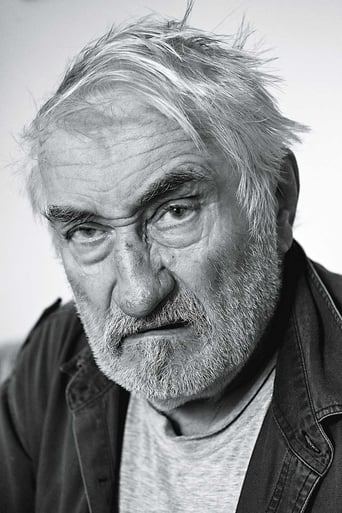Interesteg
What makes it different from others?
Diagonaldi
Very well executed
AboveDeepBuggy
Some things I liked some I did not.
SoftInloveRox
Horrible, fascist and poorly acted
FilmCriticLalitRao
Can we say that maverick Czech director Jan Sverak has lost his magical art of making wonderful films if his latest offering "Vratné Lahve" were to be considered as an ordinary film ? The answer would be in negative as he has made one of those mischievous films whose message might not instantly dawn on ordinary audiences but allows to appreciate character development which is perfectly in sync with general mood and rhythm of the film."Empties" presents an honest assessment of some very good views of Prague,a city which has changed enormously after the fall of communism and arrival of free market economy.This is not the sole reason for watching this film.One must watch "Empties" in order to understand that a man is young as long as his desire for beautiful young women is intact.In the past,this oft repeated message has been conveyed in numerous films but what makes Jan Sverak film appear as a face in the crowd is that fact that he has chosen to direct his father Zdenek Sverak to direct a film about joys and sorrow of old age of those Czech people who are currently feeling that repressed sexuality of communist times is getting rejuvenated in free market world of capitalism.
Jiri Severa
This is an exhilarating comedy about getting old and wanting to relive a great romance. The setting is simple, and a lot of the prancing and romancing comes tongue in cheek in the fine tradition of Czech bitter-sweet, self-deprecating humour. In this, Zdenek Sverak is the great master, he is the perfect fit to render the cynically aloof, yet secretly wistful, character of the Empties. Of course, since he wrote the screen play he shows he knows himself well and is quite comfortable with what he knows. So, it's a feel-good movie and well worth seeing for everyone.Naturally, there are scenes and comments in the movie which may escape viewers who rely on subtitles. I see for example on the DVD blurb that Tkaloun (Sverak's character) refuses to accept that old age is empty...among other things... of 'value to society'. But the plot of the movie says exactly the opposite. Tkaloun does not not give a rat's ass about what he does for a living or (poetically), where he goes. He wants "little love", and for that he would go "to the ends of the world, head uncovered and feet bare, in the dead of winter". The movie opens with Tkaloun reading these verses of Vrchlicky, a great Czech poet of 19th century, to a class of kids who don't care. Tkaloun then quits teaching, after being scolded by the school-mistress for assaulting the head honcho of his eight-graders who insulted his beloved poet. He gets a job as a bicycle courier - fantasizing about getting into shape. When he breaks his leg, he finds another job, handling the returns of empty bottles in a super-market. His wife - also a teacher, scoffs at such an undignified job for an educated man, and forswears she'd never set foot in the place where he works to see him humiliated. But, Tkaloun plugs in the place and likes his newly found freedom doing silly chores because he can fantasize about having sex with younger women during working hours. That's 'the value to society' that Zdenek Sverak has in mind for Tkaloun.Great. Hilarious. Kind of saccharine ending but I take it.
P-frish
We saw this film when it was first released in Prague, bought the screenplay in Czech, and now own the DVD. This masterpiece from the father-son Sverák team is a gentle low-key story that has appealed here to all ages. It was the most popular movie of the year in terms of theater attendance. The theme is "the search for love" in its very broadest sense, with the sub-theme of the impact of freedom and capitalism on lives in the Czech Republic.The main character, sixty-five year old Josef Tkaloun, introduces the theme in his classroom of Czech teenagers. In his lesson about a beloved Czech writer, Jaroslav Vrchlicky, he quotes: "For a little love, I would go to the edge of the world bareheaded and barefooted." We follow this theme in his own life and marriage, his daughter's and little grandson's lives, as well as in those of various other characters, young, middle-aged, and elderly, who surround him.Neither Zdenek Sverák as a writer nor the character of Tkaloun he has written for himself is a judgmental man. Tkaloun's most characteristic response perhaps, is a quiet, "Jo takhle" or "Ah, so that's how it is." Sverák sketches a small world and, within it, gives us a very poignant human story permeated with a feeling of acceptance of all of us in our various weaknesses.The sub-theme of changes in Czech life since the 1989 revolution may be harder for non-Czech viewers to catch entirely. The local library, for example, has been replaced by a new teeth-whitening business called "Happy Smile." In this one little touch, Czechs will recognize the loss of their public library, the introduction of a strange, expensive, and hitherto unnecessary business, and the current vogue for abandoning Czech for the snobbier, more chic English name.We also see how the very young, without memories of the "old" days, consider all this as the normal state of affairs, though they realize that their parents or grandparents do not. In a small closely-knit society such as the Czech Republic, relations between generations, whether within the family, at work or school, or in public, have been markedly different in many ways than what one sees in a country such as the U.S. This is now changing with the influx of dubbed television programs, translated popular magazine articles, and advertising. Many youngsters now prefer to go to the mall rather than on the traditional family trip to the countryside, for example. Although most still automatically get up to give their tram or metro seat to an older person, some now ignore this previous mark of well-brought-up behavior.We should mention, too, that we find the humor delightful. Even on a third viewing we laughed. These performances stand up in the long run.This movie will definitely be a classic. Thank you Zdenek and Jan Sverák!!!
faterson
I hope comments formatted as bullets are OK; no real spoilers contained.* a masterpiece and return to true Zdenek Sverak form (after the flop of _Dark-Blue World_, a woeful departure from Zdenek Sverak's typical comedy genre) * airborne views of the Czech countryside, with which Zdenek Sverak is in love -- this time, *closely integrated* in the movie's climax, as opposed to similar shots in Zdenek Sverak's earlier movies -- though breath-taking there as well, they used to serve as mere illustrations; now, they're part of the movie's message * the number OK-5060 on the balloon is highly symbolic, meaning to say you can still have a great life while in your 50s or 60s -- which was Sverak's age at the time the movie was written and produced -- in fact, Zdenek Sverak is over 70 years old today (born in 1936), and looks astonishingly well for his age; metaphorical swelling and inflating of the balloon after falling to the ground -- "dying", as if, but not yet, not quite; "there's still something left" in our lives * movie title, "returnable bottles", in line with the movie's title song: "I'd like to have another one, thank you" -- meaning another *life*, to understand or enjoy even *more* of it than the first time around; so, human lives are like returnable bottles...* Zdenek Svěrák's impeccable performance; he can be thoroughly serious whenever the need arises; there are some extremely poignant and thoroughly serious moments in the movie, particularly in depicting the (grand)parent-child relationship; Sverak's inimitable enunciation, especially untranslatable: he can say an ordinary Czech sentence but deliver it in a way that makes it sound funny or witty, *without* being theatrical * *two* endings are contained in the movie: one US happy ending (an American movie would have ended right there); but, after the credits for the cast roll by, *another* ending is attached, a thoroughly European tongue-in-cheek one; in it also lies the movie's wisdom -- life is always about compromises between what one dreams about (all those half-naked ladies in the train's compartment) and what truly is available in real life, and for what one must be genuinely thankful, because it is such a blessing, even though oftentimes humdrum on ordinary days -- in _Vratne lahve_, this is the 40-year marriage between Pepa and his wife * a fascinating array of supporting characters, from the hilarious "talkative" ex-Major to the awkward youth at the paper press to the lustful mathematics teacher and the thoughtful, tender-hearted IT teacher, as well as the irresponsible, shallow doctor; or the old lady who can't afford her groceries * you can recognize the greatest masterpieces in art by their being capable of mixing thoroughly disparate elements: such as being funny and moving / serious at the *same* time; _Vratne lahve_ manages this trick *throughout*; even though the basic plot is predictable enough (the man is about to lose his job due to automation), its implementation is glorious, and when Pepa gets the note saying, "Mr. Tkaloun, what are today's discounts?", this is a truly affecting moment; a similar one involves Pepa, in despair, placing his head and hands on the wall of his small booth, then realizing (thanks to the stains) how often his colleague must have been desperate before him, in just the same manner -- needless to say, the despair was sexually motivated * fantastic direction by Jan Sverak, with minuscule attention paid even to the smallest detail; whenever pretty girls are meant to be shown in _Vratne lahve_, they are not merely pretty, but *gloriously* beautiful; watch the 2 girls re-stocking the supermarket shelves, or even the very young girl sitting behind the cheeky schoolboy in the movie's opening scenes -- all these are fantastically beautiful girls, even though they appear in the movie for barely a few seconds, or dozens of seconds; yet Jan Sverak made sure every little thing in the background of the main action shown was just 100% perfect * classic, famous Zdenek Sverak wit apparent throughout _Vratne lahve_; just as Woody Allen has his style of humour that is unmistakably his, and Billy Wilder has his own, so does Zdenek Sverak. The quality of some of the jokes in _Vratne lahve_ is on a par with now legendary jokes from movies like _Kolja_ or _The Elementary School_ or even as far back as _My Sweet Little Village_, _Waiter, Run_, and _Hand Me the Pen, Mark_. Ladislav Smoljak, Zdenek Sverak's close friend and collaborator since decades, has nothing more than 2 short cameos in _Vratne lahve_, but they certainly are memorable: funny and wise at the same time, capturing the spirit of our hurried era: "He's just some sort of a messenger, but he sure looks like the participant in a race!" * wonderful camera-work: the movie manages to be both rural and urban at the same time; glorious views of Prague *and* the surrounding countryside, the rolling Czech land in its amazing verdure, again establishing the connection to the earlier Zdenek Sverak classics * fantastic title song, sung by Jaroslav Uhlir, as the title tune from _Waiter, Run_, made almost 30 years ago in the 1980s! One may only wish that both _Vratne lahve_ the movie *and* its title song become classics of the same calibre as both _Waiter, Run_ and its title song; _Vratne lahve_ thoroughly deserves the status of a classic, even though it is only about 9 months old at the time when I'm writing this sentence! * the running theme through pretty much all of Zdenek Sverak's movies is that of sexual obsession, and it takes center stage here in _Vratne lahve_, too; again, most closely reminding the viewer of the early 1980s masterpiece, _Waiter, Run_, thanks to the numerous "fantasy sequences", so similar to those so frequently experienced by the bookstore manager in _Waiter, Run_.

